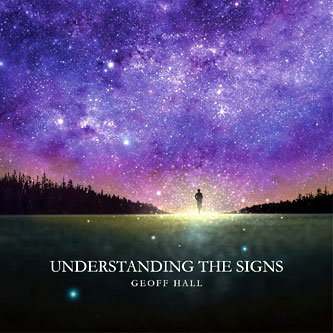 Colorado-based
composer Geoff Hall takes electronic-based synth music to high
elevations on his 2016 release Understanding The Signs.
The eight track CD has a great sonic chemistry and combines a
wealth of New Age-related instrumental sounds that blends in with
other musical genres, including film soundtracks and neoclassical
flavors. It’s interesting to note that Hall is also a guitarist
yet, Understanding The Signs is completely orchestral, synthesized
keyboard dominated music. Speaking about the meaning of the album
title, Geoff tells mwe3.com, “The ability to get outside ourselves
and the daily routines that define a large part of our lives is, in
my opinion, very important. Achieving that separation and objectivity
can result in a cleaner line of sight or clarity of thought that’s
hard to get to in the course of a normal day. While I don’t necessarily
subscribe to the idea of “signs,” I do appreciate the implications
of them. The title is a play on that.” Hall is claiming that
his follow up release will be more guitar-centric yet, for synth keyboard
watchers and fans of music by Tangerine Dream and Vangelis, Geoff
Hall’s Understanding The Signs provides quite an appealing
hour of synthesized, instrumental New Age bliss. www.GeoffHallComposer.com
Colorado-based
composer Geoff Hall takes electronic-based synth music to high
elevations on his 2016 release Understanding The Signs.
The eight track CD has a great sonic chemistry and combines a
wealth of New Age-related instrumental sounds that blends in with
other musical genres, including film soundtracks and neoclassical
flavors. It’s interesting to note that Hall is also a guitarist
yet, Understanding The Signs is completely orchestral, synthesized
keyboard dominated music. Speaking about the meaning of the album
title, Geoff tells mwe3.com, “The ability to get outside ourselves
and the daily routines that define a large part of our lives is, in
my opinion, very important. Achieving that separation and objectivity
can result in a cleaner line of sight or clarity of thought that’s
hard to get to in the course of a normal day. While I don’t necessarily
subscribe to the idea of “signs,” I do appreciate the implications
of them. The title is a play on that.” Hall is claiming that
his follow up release will be more guitar-centric yet, for synth keyboard
watchers and fans of music by Tangerine Dream and Vangelis, Geoff
Hall’s Understanding The Signs provides quite an appealing
hour of synthesized, instrumental New Age bliss. www.GeoffHallComposer.com
mwe3.com presents an interview with
GEOFF HALL
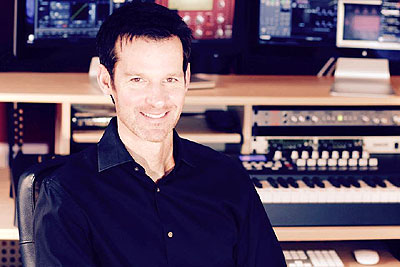 mwe3:
Tell us something about where you live now and what you like best
about it. I know you’re from Virginia but what was it like growing
up in Memphis? It’s such a musical town. How would you compare
Memphis with Nashville? Are they two different vibes?
mwe3:
Tell us something about where you live now and what you like best
about it. I know you’re from Virginia but what was it like growing
up in Memphis? It’s such a musical town. How would you compare
Memphis with Nashville? Are they two different vibes?
Geoff Hall: I live in Boulder County, Colorado. We’re
just a few minutes outside of the town of Boulder. This is our “adopted”
home, and we love it. We’ve been here about 15 years in total.
We enjoy the mountains, all the outdoor activities, and the laid back
culture in Colorado. It’s a stark contrast to growing up in Memphis—not
that I’m knocking Memphis, but the 2 places don’t have a
lot in common. As you said, Memphis is a musical town, and it was
nice to have that in high school and college. It’s very heavily
dominated by blues, but there are also other artists in genres sprinkled
around. Years ago, Memphis was a fairly well-known place for bands
to record. There were a number of studios there that were “on
the map” so to speak. I’ve been removed from it for some
time, but I think Nashville has the edge on Memphis in a lot of respects.
It’s a nicer city with a more evolved and connected music scene.
The one thing I’d say Memphis has over Nashville is the barbecue!
You can’t beat it!
mwe3: You’re also a guitarist so how did you decide to
veer into electronica and orchestral sounds for your new album? Is
this your first CD? I hear you’re going to feature guitar on
your next album? Tell us about your favorite guitars, synths and other
gear you recorded Understanding The Signs with.
Geoff Hall: I know; it seems a little bit backwards. Understanding
The Signs is my first release, and there’s almost no guitar
on it. My only explanation is that about 15 years ago, I got serious
about studying multi-instrumental music, composition, and orchestration,
and this was just after I began noticing and listening to music that
spanned a range of genres where the guitar was notably absent. Neoclassical,
ambient, New Age, and film scores. That’s not to say there’s
no guitar in those genres, but if it’s there, it’s less
noticeable… just another voice in the mix. I just fell in love
with the sound the complexity and the challenge of composing multi-instrumented
music. And, I really enjoy the sense of musical freedom that comes
with it.
I suppose I’ve been on a bit of a musical journey or evolution
over the last 30 years. Painting it with a very broad brush... you
could say I started with guitar, rock music, shred guitar, solo electric
guitar, solo finger style guitar, classical guitar, synthesizers,
and then bridged into New Age via guitar with guys like Will Ackerman,
Alex de Grassi, and other players, that opened up a lot of new music
for me in that space. Music that really didn’t have much guitar.
From there, I started to pay serious attention to film scores. There’s
such a wide range of work in that space that it’s tough to categorize.
That said—and as you already know—there are some incredible
pieces of music out there. I really enjoy and appreciate a great score.
And there are so many good examples. Ultimately, they began to influence
what I listened to and how I listened. And so, I think that’s
how I ended up with a first release that wasn’t focused on guitar.
Now, all that said, yes—you heard right—the next CD will
have the guitar in the middle of everything. I’m working on it
now, and I think there will be some solo pieces and there will be
pieces with other instrumentation accompanying the guitar. That could
be traditional instrumentation or modern alternatives like synths.
I may, in fact, have 2 variations on some of the pieces so that there’s
a solo guitar version and an instrumented version of the same piece.
We’ll see. I hope to have it out by the end of this year.
Favorite guitars… let’s see. On the electric side, I’m
a bit of a PRS fan, but I also have a Strat that I play a lot. On
the acoustic side, it’s a different story. I have a number of
guitars from builders like Ryan, Maingard, Hamblin, Redgate, Mueller,
and a few others. My acoustic guitar collection is twice the size
of the electric.
My studio set up at the house is pretty straightforward. I use the
new Symphony I/O, a D Box for summing, Burl Pre-amps for recording
acoustic guitar, and an AX-FX for the electric. I also have a baby
grand acoustic piano, which I love to noodle on. Very often I’ll
sit at the piano and sketch out some ideas that I’ll then take
into the studio and start to orchestrate. I use a midi board/synth
in the studio to access a wide range of virtual instruments, like
a lot of folks do these days to keep costs manageable. From there,
the sky’s the limit on what can happen.
mwe3: Is there some symbolism behind the title of the album?
Understanding The Signs has such broad implications. Also who
designed the artwork, it’s very effective. I love the purple
and white pattern.
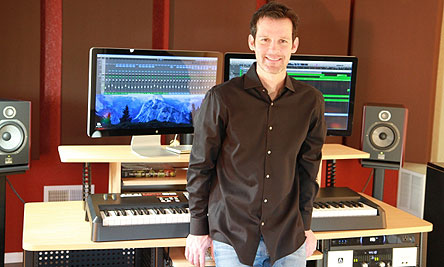 Geoff
Hall: It makes me smile to hear you say that the title has such
broad implications. That means it worked! And thank you for the comments
on the cover art. It’s nice when people notice those details.
And yes, there is some meaning in the artwork that links to the pieces
in the release. Without belaboring it too much, I’ll say this
as far as the connection is concerned: The ability to get outside
ourselves and the daily routines that define a large part of our lives
is, in my opinion, very important. Achieving that separation and objectivity
can result in a cleaner line of sight or clarity of thought that’s
hard to get to in the course of a normal day. While I don’t necessarily
subscribe to the idea of “signs,” I do appreciate the implications
of them. The title is a play on that.
Geoff
Hall: It makes me smile to hear you say that the title has such
broad implications. That means it worked! And thank you for the comments
on the cover art. It’s nice when people notice those details.
And yes, there is some meaning in the artwork that links to the pieces
in the release. Without belaboring it too much, I’ll say this
as far as the connection is concerned: The ability to get outside
ourselves and the daily routines that define a large part of our lives
is, in my opinion, very important. Achieving that separation and objectivity
can result in a cleaner line of sight or clarity of thought that’s
hard to get to in the course of a normal day. While I don’t necessarily
subscribe to the idea of “signs,” I do appreciate the implications
of them. The title is a play on that.
Understanding events in our lives as “signs,” looking for
and understanding the meaning in what people say or do, realizing
the cause and effect of the decisions we make everyday, reaching out
beyond ourselves to put all of that together in an effort to be a
better individual and to make better decisions. All of that is part
of it. And it’s personal for everyone. It has to be accomplished
or realized as an individual. So, the lone runner, getting outside
of himself or herself, under that sky, it’s all a play on those
ideas. The titles of the pieces all link to an experience or emotion
someone under that sky could be contemplating. In fact, the title
for the CD was almost “Under the Night Sky.” I liked the
symbolism of the stars and the individual’s pursuit of understanding.
mwe3: Who else helped you get the sound onto disc? Did you
work a lot on the CD mastering? Is it a delicate balancing act to
get the right sound and do you master different for CD compared to
MP3 and other downloads?
Geoff Hall: When I’m writing, I try to keep the mix in
mind. In orchestration, you’re constantly thinking about things
like the handoff of an instrument or group of instruments to another,
the levels, who should be in the foreground, the middle ground, the
background, is this or that part overwritten, do you need a counter
line here or there, it never ends. And that’s part of what’s
so great about it. You have to make hundreds of choices every time,
and the final outcome is the result of all those individual decisions.
So, yes, I think about the mix constantly.
For Understanding The Signs, I created my own mixes. Then I
took them to a professional recording studio (Airshow Studios in Boulder)
to have it remixed and then mastered. The reason I did that was because
I wanted outside ears on everything. You get so accustomed to your
own work and how you think it should sound because you’ve listened
to it a million times as you work on it, that you can lose some objectivity.
With this kind of music, there’s a lot to the subtleties. The
mixing phase is really the hardest part. There’s a lot of back
and forth. The engineer thinks this, you think that, he wants to bring
this up or down, you want to bring that up or down. It’s a collaborative
process, and in this case, I think it served the recording a lot better.
You don’t always end up with what you thought you were going
to have, but hopefully you end up with something at least as good
or better with another professional in the mix.
On the mastering side, it was a no-brainer. David Glasser has a great
ear and really did a nice job with the overall sound and continuity
of the release. A number of these pieces are “dense.” There’s
more instrumentation that may be obvious to a listener on the first
pass. David understood that and did a good job balancing each track
to ensure that the character of each piece was preserved.
I do have some other work that’s in the film/TV score genre that
I mixed and mastered myself. I’m not a mastering engineer, and
in truth, I don’t really want to be. I enjoy being the composer.
So, the mixed/mastered versions that I’ve done are good, but
I wouldn’t claim that they’re in the same category as David’s
work. That said, they’re high enough quality for their intended
use. Some of them are posted on my Soundcloud page for anyone who’s
interested.
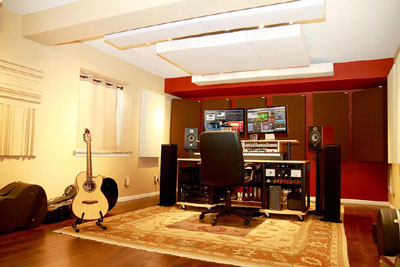 mwe3:
What era of music did you grow up with? You were around 15 when YES
returned in 1983 with Trevor Rabin right? It sounds like you have
a great interest in the soundtrack area of music but it also shows
your affinity for progressive rock instrumental. There’s always
been great instrumental music in rock but you have to look for it
right?
mwe3:
What era of music did you grow up with? You were around 15 when YES
returned in 1983 with Trevor Rabin right? It sounds like you have
a great interest in the soundtrack area of music but it also shows
your affinity for progressive rock instrumental. There’s always
been great instrumental music in rock but you have to look for it
right?
Geoff Hall: It’s funny because I feel like an amalgamation
of so many different types of music. It would be hard for me to point
to only a handful of bands or musicians that really had the greatest
impact. I’m afraid, I’m a contradiction in terms on this
subject.
To keep it somewhat brief, I grew up listening to John Denver albums
and some of the late 1970’s music my parents had in the background.
But, my first “ah-ha” moment with music was really with
Rush as a 12 or 13 year old kid. It just hit me in a different way
and that began my slide into the world of progressive rock, guitar
and all the rest of it. But the truth is also that I actually loved
a lot of 80’s music, which I can’t believe I’m admitting
here, but I did. To this day, my iTunes account looks like someone
randomly selected thousands of songs from the iTunes store, threw
them into a bag, shook it up, and dumped it into my library. Everything
from Rush to Harry Gregson Williams to LAGQ to Peter Gabriel to Eric
Johnson to John Williams to Segovia to U2 to YES to the Prague Philharmonic
to Enya, and on and on...
I absolutely agree—there is some great instrumental music in
rock, but you do have to look for it. Lately, I’ve been listening
to a band out of Nashville called Hammock. They’ve got some interesting
instrumental pieces that might be called “post rock”. I’m
not certain, but it’s a cool sound.
mwe3: Trevor Rabin returned to film soundtrack world after
YES. Which Rabin soundtracks have you heard and what are some of your
favorite film scores by other composers, orchestral and/or electronic,
and why?
Geoff Hall: I was a big fan of the Trevor Rabin years with
YES. I know a lot of folks who feel differently about that, but I
really enjoyed his work with YES on those albums. The thing is that
in addition to being a talented guitarist, he is also a great composer.
I’m not sure I know of another guitar player who went on to write
orchestral scores, hybrid or otherwise, for films after spending time
as a lead guitarist in a band. I’ve never met him, but I’d
love to talk with him about that transition. If I recall correctly,
he got a break with Hans Zimmer and then Steven Segal and it took
off from there. He’s got a wide range of score types, but I think
the National Treasure movies were some of the more memorable
for me.
 As
far as scores go, I am a big fan of guys like Harry Gregson Williams,
Henry Jackman, Hans Zimmer, Dennis McCarthy, Howard Shore, John Williams,
James Horner, Patrick Doyle, and Tykwer/Klimek/Heil who composed the
music for Cloud Atlas. I’m also a fan of Jeremy Soule
who wrote the score for the game “Skyrim”. There’s
some really great work in that score.
As
far as scores go, I am a big fan of guys like Harry Gregson Williams,
Henry Jackman, Hans Zimmer, Dennis McCarthy, Howard Shore, John Williams,
James Horner, Patrick Doyle, and Tykwer/Klimek/Heil who composed the
music for Cloud Atlas. I’m also a fan of Jeremy Soule
who wrote the score for the game “Skyrim”. There’s
some really great work in that score.
I’m actually not partial to hybrid or traditional orchestral
work. I enjoy both very much. What’s important is what serves
the film the best. Sometimes, I think you need a traditional orchestral
score and there are other times when it’s ok to bring in modern
instrumentation and expand your palette. Ultimately, it ought to be
a question of what optimizes the emotional goal of the scene or movie.
mwe3: When did you go to Berklee to study in the Music Professional
Program? What part of the Berklee experience made the biggest influence
on your approach to composing and recording?
Geoff Hall: It’s a great program. My focus was on orchestration
and scoring for film/TV. I’ve gradually worked through the courses
over the last couple of years, and it’s really been valuable.
I’ve been a student of music for over 20 years, but I still learned
a lot in that program. Everything from writing and arranging material
for orchestra to film scoring techniques to breaking scores apart
to see how they were created to learning different strategies for
approaching different types of visual situations and emotions. It
was time well spent.
mwe3: You were so influenced by the Windham Hill sound. Do
you have any contact with Will Ackerman and also tell us about the
Shawn Lane influence. What albums from Shawn do you like? He died
in 2003 so you must have known here way back when.
Geoff Hall: My first exposure to the content of Windham Hill
was when someone introduced me to the music of Will Ackerman. From
there, I discovered Michael Hedges, Alex de Grassi, and a number of
other very talented musicians. Will and I don’t know each other,
but for a time I was in contact with Alex and studied with him a little
bit. He would occasionally stay with us when he was touring where
ever I was living at the time. Very nice guy, and obviously a great
guitarist.
Shawn was a guitar phenomenon, and also a really nice guy. I knew
him when I was in high school. A handful of friends, who were also
guitar players, would get together and go see him play in Memphis
on the weekends at whatever club he was performing at. He’d typically
have to get us into the venue because of the age limit, so we were
always on our best behavior, which is saying something for a group
of high school age guys sitting in a bar, just so we could watch him
play. It was mesmerizing. His story is sad because he died at a relatively
young age, and, despite being one of the best guitarists to ever play
the instrument, he was largely unknown. I was lucky to have had some
time and lessons with him. He was also a huge fan of film scores,
and in particular, John Williams, which seemed strange to me at the
time. But, years later, I would come to understand that much better
than I did then.
mwe3: As far as guitar playing goes, how do you plan to work
the guitar into the soundtracks you write? Do you use a lot of treated
guitars and computer apps to get sounds you like and what are your
favorite guitar tunings, and amps? What guitars do you want to record
with?
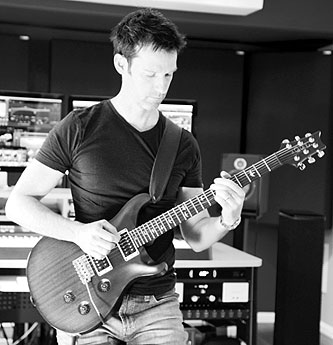 Geoff
Hall: Well, to be honest, I haven’t had an opportunity to
score a feature length film yet, but I’m trying to get a shot
at it! It’s a hard opportunity to come by these days. I think,
as I mentioned earlier, the score has to serve the film. If that film
is modern and there’s a place for guitar to play the right role,
then that would be a great opportunity. Having said that though, I’d
be just as content to write an entirely orchestral score. For me,
it’s really about figuring out the right approach for the film
and following that, whatever it may look like. I’ve scored student
films and other videos, and I deliberately avoid saying something
like, “I’m going to find a way to include this or that instrument
in this cue.” If you follow the contour of the visual, assess
the energy level of the scene, understand the story and emotion, and
recognize the impact it needs to create for the viewer, those instrument
choices become easier.
Geoff
Hall: Well, to be honest, I haven’t had an opportunity to
score a feature length film yet, but I’m trying to get a shot
at it! It’s a hard opportunity to come by these days. I think,
as I mentioned earlier, the score has to serve the film. If that film
is modern and there’s a place for guitar to play the right role,
then that would be a great opportunity. Having said that though, I’d
be just as content to write an entirely orchestral score. For me,
it’s really about figuring out the right approach for the film
and following that, whatever it may look like. I’ve scored student
films and other videos, and I deliberately avoid saying something
like, “I’m going to find a way to include this or that instrument
in this cue.” If you follow the contour of the visual, assess
the energy level of the scene, understand the story and emotion, and
recognize the impact it needs to create for the viewer, those instrument
choices become easier.
My acoustic and classical guitar set up is pretty straight forward.
I don’t use a ton of processing. I run through Neumann mics into
a couple of Burl preamps through the new Symphony I/O and into the
DAW. I’ll EQ the track and make some other mix adjustments that
might include things like reverb, compression, limiting, and other
dynamics, but nothing major.
The electric guitar is another animal though. Anything could happen
on that front. I just got a new Ax-Fx unit that I’m learning,
and the sky truly is the limit. In order to really capture the quality
of that piece of gear, you need to run it through flat monitors so
that you’re not coloring the sound with a specific kind of amplifier.
So, that’s what I’m currently doing. I use Focal Twins and
Solo 6’s in my studio currently. I really like the sound. So,
we’ll see what happens with that.
A number of pieces on the next CD will have alternate tunings. There
will also be one or two in standard tuning. When my evolution into
acoustic finger style began years ago, I learned a lot of pieces in
a wide range of tunings, DADGAD, open G, open D, drop D, EADEAE for
some Celtic pieces, and a host of others. I don’t know that I
have a favorite. I enjoy moving from one to the other. It’s actually
a nice way to look for inspiration.
Right now, I don’t know if I’ll record with 5-6 different
acoustics for the next CD or if I’ll limit it to just 1. I’ll
have to see what the variation sounds like and go from there. I’m
fortunate in that I’ve got some great instruments to choose from.
So, we’ll see…
mwe3: What’s been the world wide reaction to Understanding
The Signs and what do you make of all the great New Age and electronic
music these days? Where do you see yourself fitting into the New Age
and electronic music landscape of 2016?
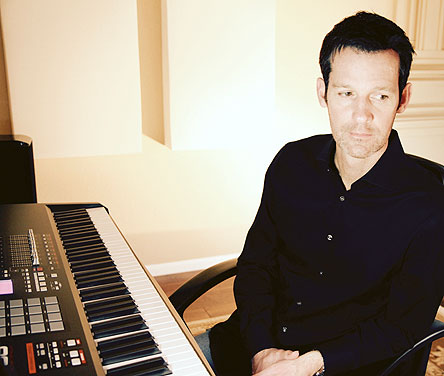 Geoff
Hall: The reaction has been very positive so far. As this is my
first release, I’ve had a lot to learn and I’ve still got
a lot to learn about the process and getting your music “out
there.” There are so many releases every year… so I think
a big part of the battle is just getting it heard. So, I’m grateful,
really, to you and others who have embraced it and are giving it some
exposure. Initially, I was told that a 5-10 percent acceptance rate
at outlets would be considered a solid showing. So far, I think we’re
at about 80 percent - and waiting to hear form the other 20. So, that
seems very positive, but I suppose time will tell. Ultimately, my
hope is that if people hear the pieces they’ll hear something
they identify with, that they can relate to.
Geoff
Hall: The reaction has been very positive so far. As this is my
first release, I’ve had a lot to learn and I’ve still got
a lot to learn about the process and getting your music “out
there.” There are so many releases every year… so I think
a big part of the battle is just getting it heard. So, I’m grateful,
really, to you and others who have embraced it and are giving it some
exposure. Initially, I was told that a 5-10 percent acceptance rate
at outlets would be considered a solid showing. So far, I think we’re
at about 80 percent - and waiting to hear form the other 20. So, that
seems very positive, but I suppose time will tell. Ultimately, my
hope is that if people hear the pieces they’ll hear something
they identify with, that they can relate to.
There’s so much great music out there, it’s always fun when
I discover something “new.” Whether it’s 5 years old,
10 years old, or 2 weeks old. I love that. I think it’s especially
true with instrumental music that it’s getting harder to categorize
it. We use the term “New Age” to cover a lot of ground.
What happens when someone has 5-6 different categories of New Age
music on their release? What happens if there’s a neoclassical
or a very emotional piece that seems like it could be part of a film
score on a release of otherwise New Age ambient music? Personally,
I like to see those boundaries get pushed. I think composers should
write what they feel and what they like. If the music is written well
enough, it should stand on it’s own. I’m not a fan of the
thought that a release has to have 8-12 of the exact same type of
pieces for continuity’s sake. If that’s the desire of the
composer, then great. And I have a lot of albums that I love that
are that way. But, I also think it’s ok to broaden that approach
and mix things up a little bit. If the music is authentic and well
constructed, the voice of the composer will come through even if there’s
some diversity.
 mwe3:
What are your other plans for 2016 and even into 2017? What can the
fans expect from you next?
mwe3:
What are your other plans for 2016 and even into 2017? What can the
fans expect from you next?
Geoff Hall: For the rest of this year, I’m trying to record
and prepare the next instrumental CD. The focal point will be the
guitar… finally, right? If it goes smoothly, I’d hope to
have it out sometime around the end of the year. Beyond that, we’ll
have to see. I’d love to be working on a film or two with someone.
Hopefully, something will come along. In the meantime, I’ll keep
composing music that I find interesting and that means something to
me emotionally.



